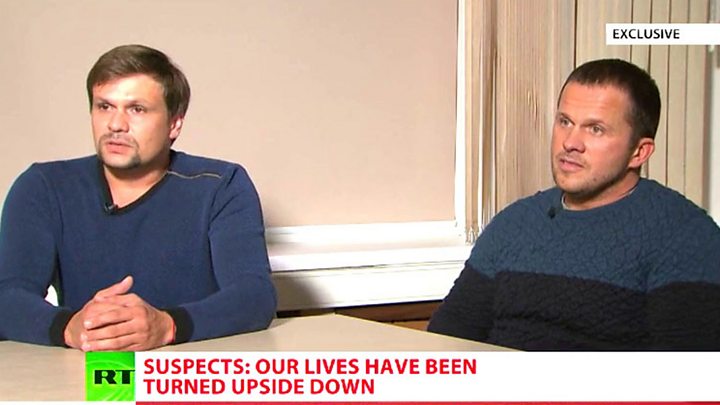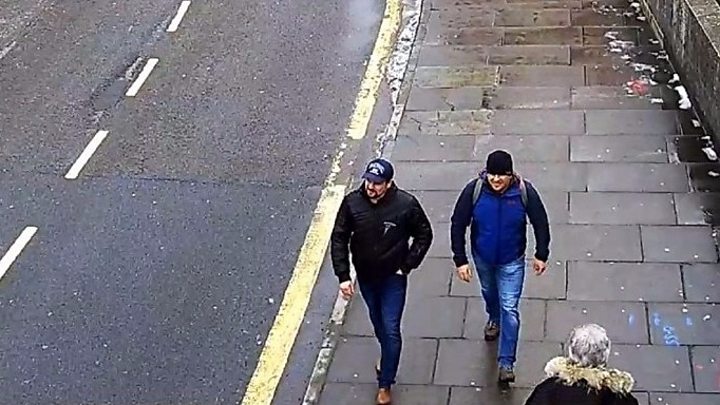
Two men named as suspects in the poisoning of a Russian ex-spy in the UK have said they were merely tourists.
The men, named as Alexander Petrov and Ruslan Boshirov, told the RT channel they travelled to Salisbury on two consecutive days because bad weather cut short their visit on the first day.
They are accused by the UK of trying to kill Russian ex-spy Sergei Skripal and his daughter Yulia in March.
The UK says they are agents of Russia's military intelligence service, the GRU.
"The town was covered by this slush. We got wet, took the nearest train and came back" to London, they told RT, Russia's state-run international broadcaster.
What are the UK allegations?
The UK's Crown Prosecution Service (CPS) has said there is enough evidence to charge the men, who are understood to have travelled to London from Moscow on 2 March on Russian passports.
Two days later, police say, they applied the military-grade Russian nerve agent Novichok to the front door of Mr Skripal's home in the Wiltshire city of Salisbury. They returned to Russia later that day.
Mr Skripal and his daughter fell critically ill but recovered after weeks of intensive care in hospital. Their current whereabouts are being kept secret.
After the RT interview was aired a UK government spokesperson reiterated that "these men are officers of the Russian military intelligence service - the GRU", and again accused Moscow of "obfuscation and lies".
UK police are linking the attack to a separate Novichok poisoning on 30 June, when Dawn Sturgess and Charlie Rowley fell ill at a house in Amesbury, about 13km (eight miles) away.
What do the Russians say?
On Wednesday President Vladimir Putin said "there is nothing criminal about them", calling the two men caught on security cameras in the UK "civilians".
In the RT interview the men confirmed their names as those announced by the UK investigators - Alexander Petrov and Ruslan Boshirov. "Those are our real names," they said.
RT chief editor Margarita Simonyan, who interviewed them, said "their passports match and the photos and the information from the British side shows it's these people".
But they denied the allegation that they were GRU agents - instead saying they were in the fitness industry.
"Maybe we did [approach] Skripal's house, but we don't know where is it located," Mr Boshirov said.
'Why women's perfume?'
When asked about Novichok they emphatically denied having had the nerve agent with them, and denied carrying the modified Nina Ricci perfume bottle which UK investigators say contained the substance.
"Is it silly for decent lads to have women's perfume? The customs are checking everything, they would have questions as to why men have women's perfume in their luggage. We didn't have it," Mr Boshirov said.
Mr Petrov said friends had recommended Salisbury to them because "there's the famous Salisbury cathedral, famous for its 123-metre spire".
"Of course we went there to see Stonehenge, Old Sarum, but we couldn't do it because there was muddy slush everywhere," Mr Petrov told RT.

Answers, but still questions
BBC security correspondent Gordon Corera
The appearance of the two men looks like the next step in the struggle between London and Moscow to convince their own publics and those around the world about their respective cases.
The amount of detail put out by British police last week, and the direct accusation that the men were officers in Russian military intelligence, was something the Kremlin will not have wanted to go unchallenged.
And the Russian government will be hoping this interview will generate sympathy at home for what are said to be a pair of sports nutrition salesmen who wanted to see a beautiful English cathedral with its 123-metre spire, but who instead have found themselves accused of being assassins.
But the risk for Russia is that the interview raises more questions than it answers and offers more details for sceptics to unpick and challenge.
How plausible are the men generally and specifically about their reasons for visiting Salisbury? How plausible is their account of their movements around the town when compared to the CCTV? And given the UK has suggested the names they use are pseudonyms, how convincing are their stories about who they are, including their past, their jobs and their travel?
What happened when
- At around 15:00 GMT on Friday 2 March, the two men arrived at Gatwick Airport
- Police say they travelled to London Victoria at 17:40 GMT, and were at Waterloo Station between 18:00 and 19:00 GMT before travelling to their London hotel
- At 11:45 GMT on Saturday 3 March, they took a train from Waterloo Station to Salisbury
- CCTV footage shows the men in Salisbury around 14:25 GMT
- The men say they spent less than an hour in Salisbury, deciding against seeing Stonehenge, Old Sarum and Salisbury Cathedral because of "muddy slush everywhere"
- CCTV footage shows the men taking a train back to London at 16:11 GMT
- On Sunday 4 March, CCTV cameras filmed the men arriving at Salisbury train station at 11:48 GMT
- Police say they were then seen on CCTV near the home of Sergei Skripal at 11:58 GMT
- The men say they then visited the ruins of Old Sarum and Salisbury Cathedral
- CCTV footage shows the men leaving Salisbury station at 13:50 GMT
- At 19:28 GMT, the men were at Heathrow Airport for an Aeroflot flight to Moscow
What next?
UK Home Secretary Sajid Javid has warned that the men, thought to be aged about 40, will be caught and prosecuted if they ever step out of Russia.
The CPS is not applying to Russia for their extradition, as Russia does not extradite its own nationals.
However, a European Arrest Warrant has been obtained in case they travel to the EU.